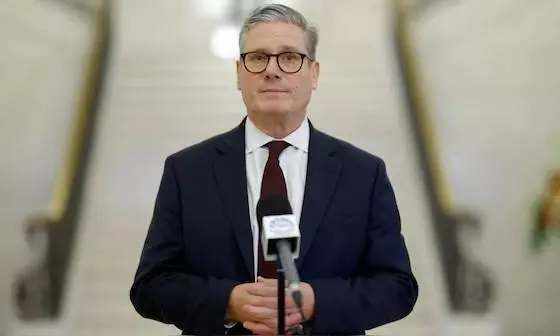
Is Starmer a one-term Prime Minister? Succession talk grows louder in the UK
text_fieldsThe current Prime Minister, Sir Keir Starmer, has the lowest approval rating of any Prime Minister since records began. This is a striking statistic, given that his party has only been in office since July 2024. His ratings are expected to fall further. Starmer is 64 — or, as some say, approaching retirement age. The United Kingdom will likely hold a General Election in 2028. Sir Keir may retire at that point. Many within the Labour Party believe he is damaging the party’s electoral prospects.
If Starmer resigns, several figures could emerge as contenders to succeed him as Labour leader — and, by extension, as Prime Minister, subject to the King’s formal appointment. The three great offices of state beneath the Prime Minister are the Home Secretary, Foreign Secretary, and Chancellor of the Exchequer. Starmer has also appointed a Deputy Prime Minister, although this is not a mandatory role.
Most Prime Ministers have previously held a great office of state. Starmer is an exception, having only served as Leader of the Opposition before entering government. During the last Labour administration, he was Director of Public Prosecutions.
Contenders
Angela Rayner — Chance: 40%
Angela Rayner currently serves as Deputy Leader of the Labour Party. Aged 44, she is well known for frequently referencing her working-class background. Her father left the family when she was very young, and her mother, who has faced mental health challenges, was unable to read. Rayner left school at 16 without qualifications, having become a single mother. She later worked in a care home and rose through the ranks of a trade union before entering politics.
Rayner, who has represented Altrincham since 2015, is seen as a strong advocate for Labour’s working-class base. Her straightforward manner appeals to many grassroots members, although critics argue that her media performances have occasionally lacked precision. She has faced scrutiny over past comments and property-related issues, though Greater Manchester Police did not pursue charges. Despite these controversies, her popularity within the party’s rank-and-file remains significant.
Rachel Reeves — Chance: 10%
Rachel Reeves is the Chancellor of the Exchequer. An Oxford graduate and former Bank of England economist, she was considered a natural candidate for leadership. However, her handling of the economy has been criticised. Reeves cited a larger-than-expected budget deficit on taking office, attributing this to the previous Conservative government. Critics argue she exaggerated the situation to justify tax increases. The resulting economic uncertainty has been linked to rising unemployment and the outward migration of high earners. Her attempt to reduce welfare spending was defeated by a Labour backbench rebellion. She has since struggled to reassert control over fiscal policy.
Reeves is regarded as highly intelligent but technocratic in style. She is known by the nickname “R squared” due to her initials and analytical approach. Despite her qualifications, her political future may be limited by recent missteps.
David Lammy — Chance: 20%
David Lammy serves as Foreign Secretary and is one of the most senior Black politicians in government. Born in the UK to parents from the Caribbean, he studied at Harvard and qualified as a barrister. Lammy represents Tottenham, a constituency previously held by pioneering Black MP Bernie Grant.
Lammy is known for his outspoken views on race, justice, and foreign policy. He is a longstanding member of Labour Friends of Israel and supports a two-state solution. While respected for his intellect and international outlook, he has not developed a strong following among the Labour grassroots. Some see his political stance as too centrist or establishment-aligned. Although Labour often emphasises diversity, it has historically been hesitant in advancing non-white candidates to leadership.
Yvette Cooper — Chance: 20%
Yvette Cooper is the Home Secretary. She entered Parliament in 1997 and served in the governments of Tony Blair and Gordon Brown. Married to fellow former minister Ed Balls, Cooper is among the most experienced politicians in the Labour ranks. However, her long tenure may be seen as a disadvantage by those seeking a generational shift.
As Home Secretary, Cooper faces criticism for a rise in crime, delays in the justice system, and increased illegal immigration. The government has also released prisoners early to ease overcrowding, and the police have been accused of prioritising training over enforcement. Cooper’s recent decision to designate Palestine Action as a terrorist organisation has attracted criticism from civil liberties groups. While respected by some for her competence, she lacks strong support among Labour activists, who view her as too centrist and careerist.
Wes Streeting — Chance: 10%
Wes Streeting is the current Health Secretary. He has attracted attention for his backstory, having been raised by a single mother in East London. A graduate of Oxford, Streeting entered Parliament at a young age and has quickly risen through the ranks. He was re-elected in 2024 despite a strong challenge from an independent pro-Palestinian candidate in his Ilford North constituency.
Streeting is openly gay and has positioned himself as a moderniser within Labour. However, he has faced criticism over NHS performance, including long waiting lists and industrial action by healthcare workers. He supports comprehensive reforms in healthcare and social policy, but his views have polarised public opinion. Some critics argue his policies on public health and gender identity have alienated traditional Labour voters.
While he enjoys support among younger members and progressive MPs, Streeting’s path to the leadership may be complicated by factional divides within the party and the vulnerability of his parliamentary seat.






